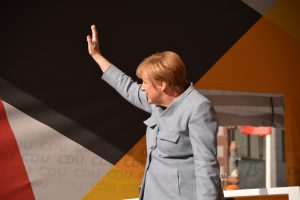
On September 26th Germany voted for a new government—and a new leader! As the election results in Germany unravelled, the whole of Europe and the world watched carefully. Indeed, Angela Merkel’s departure is significant and marks an end of an era.
Merkel is the first German chancellor, who has served a record four terms in government and earned herself a reputation of a strong European leader. Irrespective of the praise or criticism that Merkel’s actions have evoked, it is difficult to argue about her political power. Angela Merkel is perceived as one of the most significant politicians in a generation, as the de facto leader of the European Union and the ‘leader of a free world’. Given all that, the anxious outlook into the future both within Germany and beyond its borders is not surprising.
Naturally, in several weeks, or most likely months, the name of the new German chancellor will be announced. Yet, it is rather unlikely that whoever succeeds Merkel will have the same international reach and influence. Highlighting the concern, Jana Puglierin, head of the European Council on Foreign Relations in Berlin, noted that ‘No one can replace Angela Merkel, at least for the foreseeable future, because Angela Merkel had built her reputation and her political weight over 16 years’. Apart from political leaders, Merkel seems to have built a good level of trust also among the general population in Europe. As a 2020 study by the Pew Research Center indicates, 75% of adults in 14 European countries trust Merkel more than any other leader in the region. According to the same research, the next trusted leader is French president Emmanuel Macron (63%). Hence, could Macron emerge as Europe’s next most important leader?
Indeed, in the light of recent loss of a substantial submarine contract with Australia, Macron’s strong stance and vision about Europe’s future has become more pronounced. The French president urges Europe to aim for a more independent relationship with the U.S., a stance, which seems to make many EU member states uncomfortable. Macron comes across as a more aggressive leader, while Ms. Merkel is remembered as a cohesive force, who kept the EU together. Which one does Europe need more?
Although Macron’s leadership is a plausible option, analysts suggest that a Macron era is unlikely because keeping cohesive alliances in a changing geopolitical landscape is both challenging and essential. Instead, Europe might be heading towards a period of uncertainty and potential weakness…
These changes and uncertainties in the political arena made me think more broadly about global leadership succession and what could be the important implications for organizations, for example. How do we usually go about leadership succession? Is it the job itself, the role that becomes vacant, that matters the most? Shouldn’t recruiters, talent scouts and executive search consultants work hard identifying people, who would best match the job profile? In simple terms, isn’t Germany just looking for a suitable candidate to fill the vacant Chancellor position at the moment?! What I think the current discussion around Merkel’s departure reveals though, is that a previous leader’s footprint—and especially the global footprint—matters as much as the ‘formal job description’. Also, at the risk of stating the obvious, changes in any global leadership position are unlikely to go without disrupting the global network of the departing leader. Indeed, as Deloitte’s Insights suggest, many new leaders might fail in their positions because the majority of organizations fail to plan and execute effective leadership succession. As such, while unlikely for political organizations and unions, businesses should continue developing their succession planning strategies and leadership pipelines to ensure more stable and sustainable changes. All in all, as great a leader Angela Merkel may have been, no organization benefits from falling into the void when the departing leader turns out to be ‘irreplaceable’.

